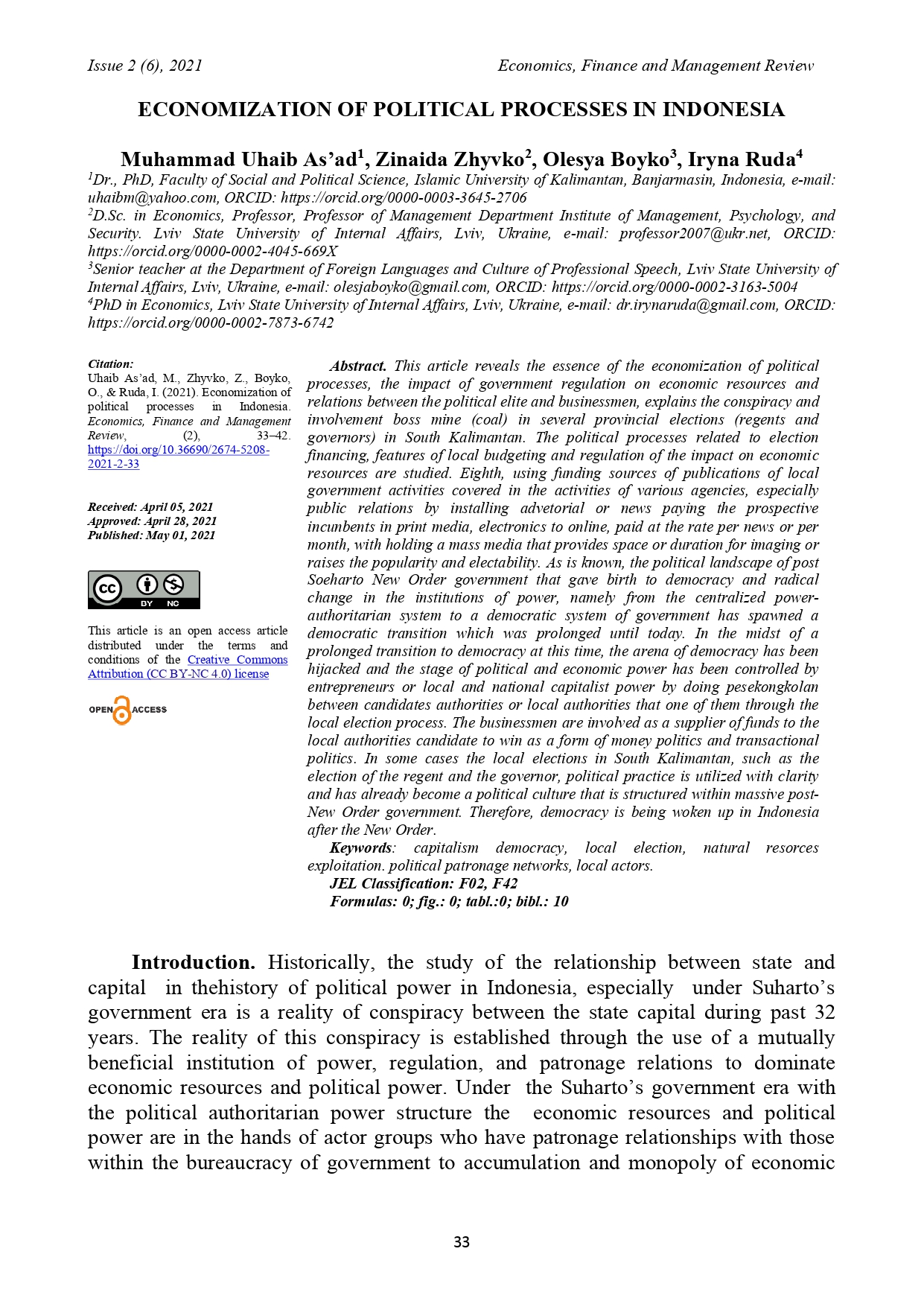ECONOMIZATION OF POLITICAL PROCESSES IN INDONESIA
DOI:
https://doi.org/10.36690/2674-5208-2021-2-33Keywords:
capitalism democracy, local election, natural resorces exploitation, political patronage networks, local actorsAbstract
This article reveals the essence of the economization of political processes, the impact of government regulation on economic resources and relations between the political elite and businessmen, explains the conspiracy and involvement boss mine (coal) in several provincial elections (regents and governors) in South Kalimantan. The political processes related to election financing, features of local budgeting and regulation of the impact on economic resources are studied. Eighth, using funding sources of publications of local government activities covered in the activities of various agencies, especially public relations by installing advetorial or news paying the prospective incunbents in print media, electronics to online, paid at the rate per news or per month, with holding a mass media that provides space or duration for imaging or raises the popularity and electability. As is known, the political landscape of post Soeharto New Order government that gave birth to democracy and radical change in the institutions of power, namely from the centralized power-authoritarian system to a democratic system of government has spawned a democratic transition which was prolonged until today. In the midst of a prolonged transition to democracy at this time, the arena of democracy has been hijacked and the stage of political and economic power has been controlled by entrepreneurs or local and national capitalist power by doing pesekongkolan between candidates authorities or local authorities that one of them through the local election process. The businessmen are involved as a supplier of funds to the local authorities candidate to win as a form of money politics and transactional politics. In some cases the local elections in South Kalimantan, such as the election of the regent and the governor, political practice is utilized with clarity and has already become a political culture that is structured within massive post-New Order government. Therefore, democracy is being woken up in Indonesia after the New Order.
Downloads
References
Allan, N. W. (2012). Diversity, Patronage and Parties and Party System Change in Indonesia. (PhD) dissertation, University of British Columbia.
Aspinall, E. (2014). When brokers betray: Social networks adn electoral politics in Indonesia. Critical Asian Studies 46 (4): 545-570.Aspinall and As’ad (2015). The Patronase Patchwork:Village Brokerage Networks and the Power of the State in an Indonesian Election. Bijdragen Tot De Taal, Land-EN Volkenkunde 171 (165-195.
Aspinall and As’ad (2016). Understanding Family Politics: Success and Failures of Political Dynasties in Regioanal Indonesia. South East Asia Research, 1-16, SAGE
Choi, Nankyung (2014). Local Politics Elites in Indonesia: Risers and Holdovers. Sojourn Journal of Social Issues in Southeast Asia, 29-2:364-407.
Hadiz, V. R. (2010). Localising Power in Post-Authoritarian Indonesaia: A Southeast Asia Perspective. Stanford, CA: Stanford University Press.
Hicken, Allen (2011). Clientelism. Annual Review of Political Science 14:289-310.
Hidayat, S. (2007). Shadow State? Business and Politics in the Province Banteng, In Schulte Nordholt H and Van Klinken G (eds) Renegotiating Boundaries: Local Politics in Post-Suharto Indonesia. Leiden; KITLV Press, pp, 203-224.
Hutchcroft, P. D. (2013). Linking Capital and Countryside: Patronage and Clinetelis in Japang, Thailand, adn Philippines; in: D.A. Brun and I. Diamond (eds), Clentelism, Social Policies, and the Quality of Democracy, pp,. 174-2013 Baltimore: Johns Hopkins University Press.
Stokes, Susan C., Thad Dunning, Marcelo Nazareno, and Valeria Brusco (2013). Brokers, Voters, and Clientelism: The Puzzle of Distributive Politics. Cambridge: Cambridge University Press.
Susanto, (2007) Ruler, Entrepreneur and Local Government Implementation Post Regional Head Election: Case of South Kalimantan Province; In: S. Hidayat (ed.), Business and Politics at the Local Level: Entrepreneur, Ruler and Government Administration Post Post Election, pp. 183-233. Jakarta: Indonesian Institute of Sciences.

Downloads
Published
How to Cite
Issue
Section
License

This work is licensed under a Creative Commons Attribution-NonCommercial 4.0 International License.




